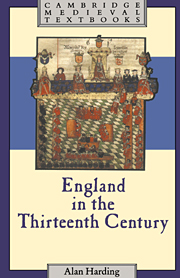Book contents
- Frontmatter
- Contents
- Preface and acknowledgements
- List of abbreviations
- Chronological table
- 1 Introduction: sources and interpretations
- 2 The peasants and the land
- 3 Traders and townsmen
- 4 Professional people
- 5 Knights
- 6 Magnates
- 7 Thirteenth-century politics
- Conclusion: the making of a state
- Guide to further reading
- Index
- Cambridge Medieval Textbooks
4 - Professional people
Published online by Cambridge University Press: 05 June 2012
- Frontmatter
- Contents
- Preface and acknowledgements
- List of abbreviations
- Chronological table
- 1 Introduction: sources and interpretations
- 2 The peasants and the land
- 3 Traders and townsmen
- 4 Professional people
- 5 Knights
- 6 Magnates
- 7 Thirteenth-century politics
- Conclusion: the making of a state
- Guide to further reading
- Index
- Cambridge Medieval Textbooks
Summary
Perhaps the towns' most important contribution of all to thirteenth-century history was their concentration and nurturing of the professional skills of law and administration which made thirteenth-century advances in government possible. From the tenth century the county towns from which the sheriff and his bailiffs operated had been the focal points of the system of territorial administration, and they were reinforced in that role by the visits of the justices in eyre to the shire court. The Normans' patronage of Benedictine monasteries and enthusiasm for cathedral-building; the settlement of schoolmen at Oxford, Cambridge and Northampton even though they lacked the prestige of cathedral cities; and the coming of the friars to the towns – all this gave urban communities an extra cultural significance and a source of intellectual justification for their activities.
ESTATE MANAGERS
There was as yet little sense that professional administrators were divided into the public officials of the Crown on the one hand and the private servants of the lords on the other: the lord king's first requirement, like any other lord's, was the administration of his estates; and the bailiffs of liberties exercised powers of government just as much as the sheriffs' officers. From the beginning of the century estate officials would have needed lists of plough-teams in order to pay royal taxes, and by Edward I's reign written records of seignorial profits had reached down to village level.
- Type
- Chapter
- Information
- England in the Thirteenth Century , pp. 149 - 179Publisher: Cambridge University PressPrint publication year: 1993

